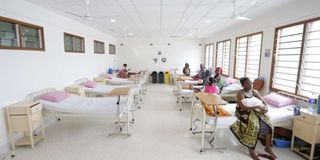Melinda Gates backs gender-equal anti-Covid-19 actions

What you need to know:
- Co-chair of the Bill & Melinda Gates Foundation notes that the threat of coronavirus disease disproportionately affects women’s livelihoods.
- Women in labour are being turned away from overburdened hospitals; adolescent girls cannot continue their online education because their communities frown at the sight of a phone in a woman's hands.
- She exemplifies the Ebola outbreak in Sierra Leone where gains made in reducing maternal death rates were reversed.
- Says decline in delivery of maternal care services in low and middle-income countries could result to deaths of 113,000 women.
Policymakers risk prolonging Covid-19 crisis and slowing economic recovery should they ignore the impact of the disease on men and women differently, says Melinda Gates.
In the article published in Foreign Affairs magazine, the co-chair of the Bill & Melinda Gates Foundation notes that the threat of coronavirus disease disproportionately affects women’s lives and livelihoods.
"Every day brings new examples of the ways in which women are being left behind by the world’s response to the pandemic," she writes.
"There are women in labour being turned away from overburdened hospitals; domestic workers whose lost income won’t be replaced by stimulus funding; adolescent girls who cannot continue their education online because their communities frown at the sight of a phone in the hands of a woman."
Ms Gates notes that countries can build back more prosperous economies if they use lessons learnt from the current crisis to transform their systems.
She exemplifies the Ebola outbreak in Sierra Leone in 2014 where gains made in reducing maternal death rates were reversed.
"The country’s health system had historically been one of the world’s worst, but the maternal death rate had dropped more than 50 per cent since 1990, and some level of antenatal care was almost universal," she states.
"When the crisis ended, the silent death toll of women and babies was even higher than its official one - 3,589 people in Sierra Leone had been killed by the Ebola virus itself. The number of additional new-borns and mothers who died during childbirth was somewhere between 3,593 and 4,936."
MATERNAL CARE
Epidemics, she says, overwhelm both immune and health systems.
She indicates that decline in delivery of maternal care services in low and middle-income countries could result to deaths of 113,000 women.
She urges health ministers to ensure provision of safe maternal care by restructuring delivery of the services in a manner that safeguards the health of mothers and new-borns.
"In some countries, that might mean designating separate health facilities — some for those suffering from Covid-19, others for mothers and new-borns who are Covid-19-free," she says.
"In other places, it may be easier and safer to bring the expertise of the clinic to the mothers themselves."
She highlights worry over dropped supply of contraceptive which she attributes to stoke piling of ingredients for manufacturing the commodities.
"A small group of countries manufactures most of the active primary ingredients for generic contraceptives, and since the pandemic hit, they’ve been stockpiling those ingredients, even though there’s no evidence they are running short on them. It’s a heart less trade policy—and a senseless one," she says.
On unpaid work, Ms Gates called for policies that ensure the work is valued.
She said policies such as paid leave for working parents and prioritising infrastructure investments such as electricity and piped water would make unpaid work less time-consuming.
"Employers can offer employees flexible schedules, the opportunity to work remotely where possible and options such as onsite childcare for those whose jobs must be done in person. All of these policies should be extended to both men and women, so that they upend gender roles instead of reinforcing them," she notes





